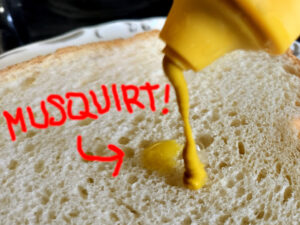
Back in the 1980s, the HBO comedy series Not Necessarily the News had a segment by Rich Hall called Sniglets, which were words that should be in the dictionary but weren’t. (I tried to submit one: Sklieu, noun, a toilet seat that doesn’t form a complete circle. My childhood comedy chops needed a great deal of sharpening).
One of my favorite Sniglets was musquirt: The liquid discharge that you get at the first squeeze of a mustard bottle. For some reason—well, not some reason, a very specific reason, that being that I am retentive—I get disproportionately annoyed when things don’t work as they should, and musquirt is one of my biggest pet peeves.
Why? Because it’s not necessary. No condiment should require this level of forethought nor be this difficult to operate.
Mayonnaise doesn’t generate inexplicable levels of condensation that spill out onto your sandwich, which is probably why I am 50 lbs heavier than I ought to be. No decent spreadable food exhibits such rude behavior, except perhaps for so-called “natural” peanut butter, which so far as I can tell is only eaten by weirdos. (And poorly named. What are Jif and Skippy, supernatural peanut butter?)
Condiments are not supposed to be work. They are bit players. Meat is the star of any decent sandwich. I have no problem expending time, care and effort on how meat is sliced. (That’s not entirely true; I should say that I have no problem insisting that the people behind the deli counter expend time, care and effort on how meat is sliced.) Condiments, in contrast, should require no effort, which is why they come in squeeze bottles*. The fact that mustard comes in a squeeze bottle but requires more than mere squeezing is, to my mind, false advertising.
* I buy my mayonnaise in regular jars rather than squeeze bottles. The way I see it, spreading it on the bread with a knife burns off the extra calories.
Anyway, you know the drill: You pick up the mustard bottle, you squeeze it, and splash—your beautiful, carefully-prepared sandwich is doused in watery musquirt. Presumably this can be avoided by shaking the bottle, which admittedly I often forget to do, but even when I do remember, it seems that often as not I get a trickle of musquirt anyway. It’s as if the mustard is just being difficult in order to spite me. Mr. French’s, wherever you are, you’re an asshole.
Here’s the thing that baffles me about musquirt: Where the hell does it come from? Don’t tell me it’s the separation of the vinegar and water that are mustard’s primary ingredients. I reject that hypothesis because every bottle of mustard has an inexhaustible supply of musquirt. Think about it: If each bottle of mustard contained a finite amount of musquirt, you’d either a) get an annoying trickle only for the first couple of squirts, or b) use two-thirds of the bottle and find a solid, concrete-like slab of dehydrated and devinegarized mustard at the bottom of the bottle.
And yet that never happens. Every squeeze of the mustard bottle, be it the first from a virgin container or the dregs that require you to harness inertia by hurling the inverted mustard bottle toward the floor without actually letting go*, has a ready supply of musquirt ready to soak the sandwich of anyone who dares to forget to shake… and even a few who remember.
* This invariably prompts my spouse to ask why I would go to such extreme effort to get that last bit of mustard when a new bottle costs $3.29 and surgery to repair a torn rotator cuff costs $15,000.
I have fought a life-long battle against musquirt and I find myself ready to accept defeat. If life has taught me anything, besides the fact that anyone who says “honesty is the best policy” should not be trusted with your car, it’s this: Musquirt never goes away.
Maybe mustard is the supernatural condiment.
© Aaron Gold
